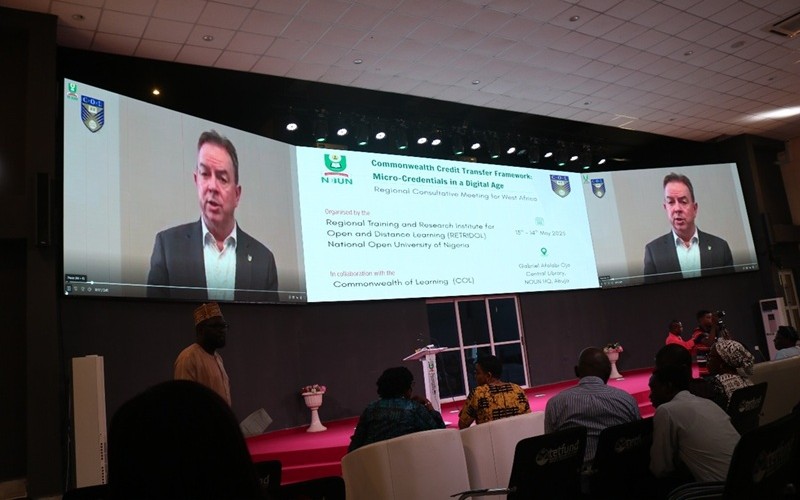
As part of a broader initiative by the Commonwealth of Learning (COL) titled “Developing a Commonwealth Credit Transfer Framework: Micro-credentials in a Digital Age”, stakeholders from West Africa recently convened at the National Open University of Nigeria (NOUN) to share region-specific insights. Over 110 national and institutional representatives from six Commonwealth West African countries: Cameroon, The Gambia, Ghana, Nigeria, Sierra Leone and Togo – participated in the workshop.
In his virtual welcome address, Professor Peter Scott, President and CEO of COL, highlighted the potential of a micro-credential framework to facilitate the recognition and transfer of qualifications within and across national borders. He noted that COL has already produced three research reports, identifying best practices, current needs, and available technologies relevant to micro-credentialing. Professor Christine Ofulue, Director of the Regional Training and Research Institute for Distance and Open Learning (RETRIDOL), expressed deep appreciation to COL, describing the workshop as a significant milestone in the standardisation, recognition, and mobility of micro-credentials across the Commonwealth.
Professor Jane-Frances Agbu, Advisor: Higher Education COL, observed that the workshop was one of five regional consultations which aim to bring diverse perspectives together to create a shared framework that builds trust, recognition, and transferability for micro-credentials across borders.
Speaking on behalf of his commissioner, Dr Roland Kouakou of the Economic Community of West African States (ECOWAS) Commission reiterated their support for COL’s initiatives. He commended COL’s consistent leadership in capacity-building across West Africa and expressed hope that the workshop would lead to tangible outcomes for credit transfer among member states. “Let us work together to build a new and effective partnership,” he urged. In his opening remarks, Professor Olufemi Peters, Vice-Chancellor of NOUN, called on educational institutions, regulators, and industry stakeholders to collaborate in developing a structured policy framework that ensures quality, relevance, and national alignment for micro-credentials.
The workshop featured plenary presentations and group activities. Key sessions covered the nature and role of micro-credentials, based on findings from COL’s status study, including:
- country and institutional case studies;
- an overview of technologies for digital micro-credentials and registries;
- existing frameworks; and
- proposed elements of the Commonwealth Credit Transfer Framework.
Group activities encouraged participants to analyse existing micro-credential and credit transfer systems, explore national qualification practices, develop strategies for mainstreaming micro-credentials, and draft institutional and national action plans.
Participants acknowledged that many countries in the region face similar challenges in implementing micro-credentials and agreed that collective effort and mutual support are essential for overcoming weaknesses and building resilient systems.
The workshop concluded with a commitment to ongoing collaboration, shared learning, and a unified push across the Commonwealth to enhance the effectiveness, recognition, and transferability of micro-credentials.


